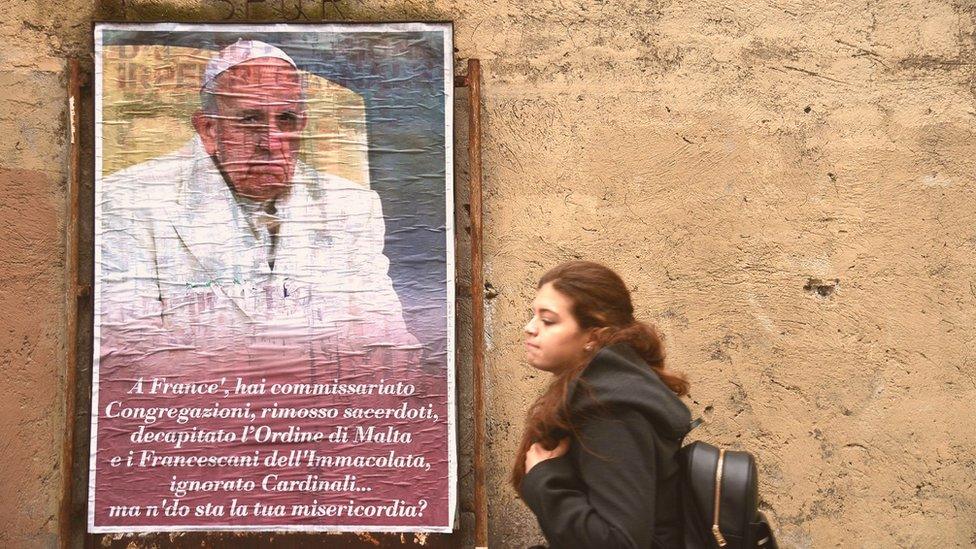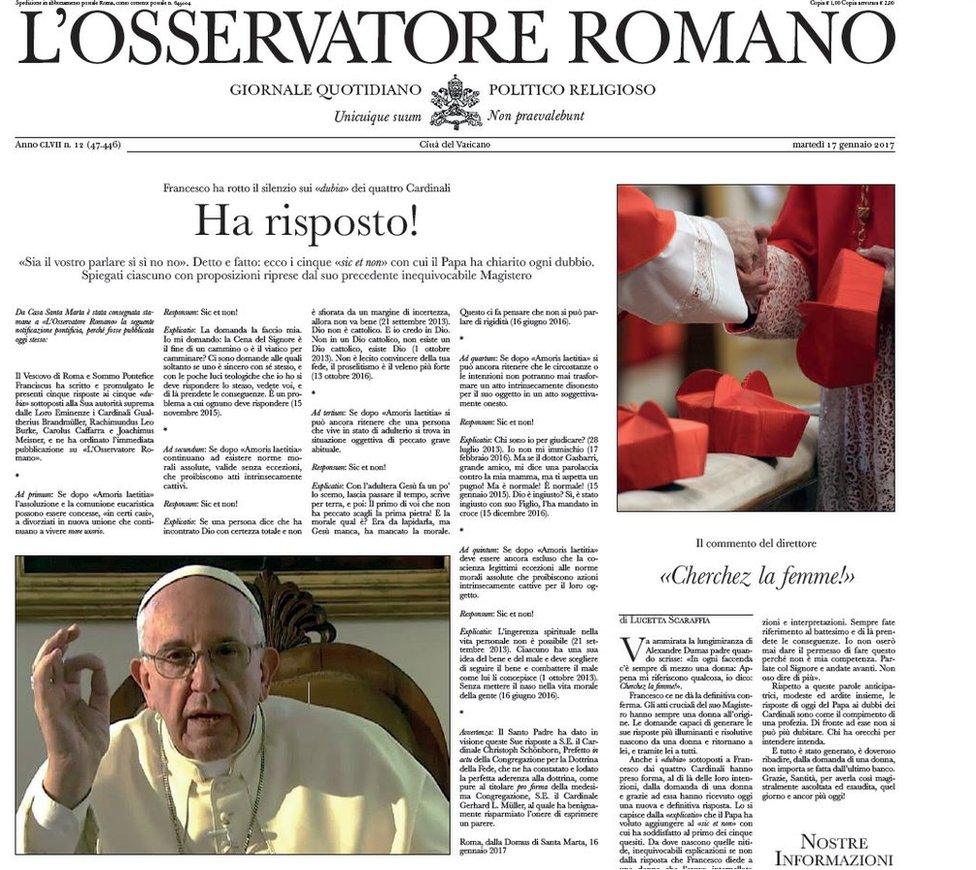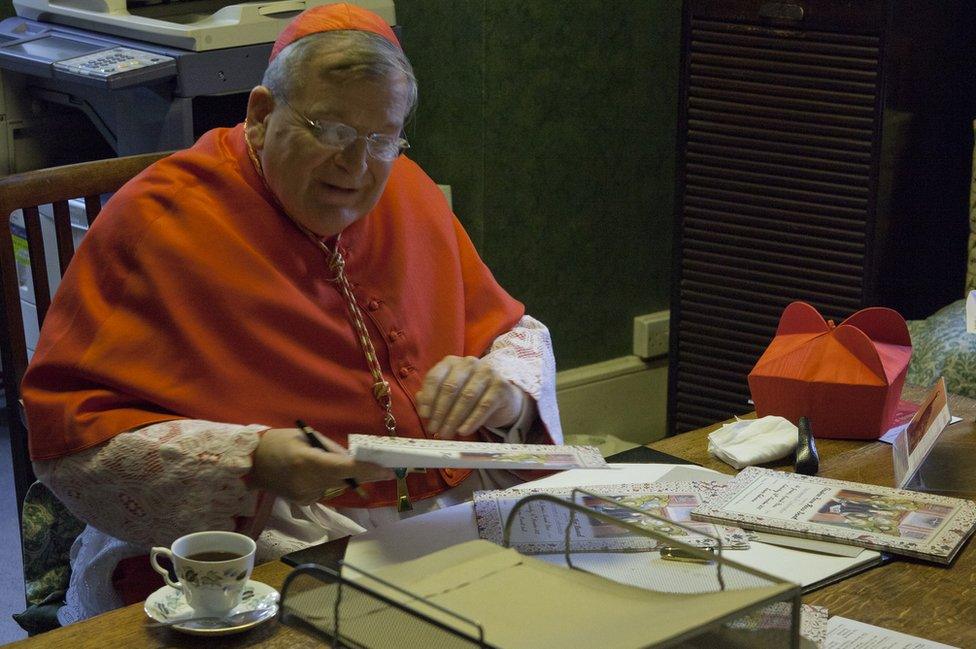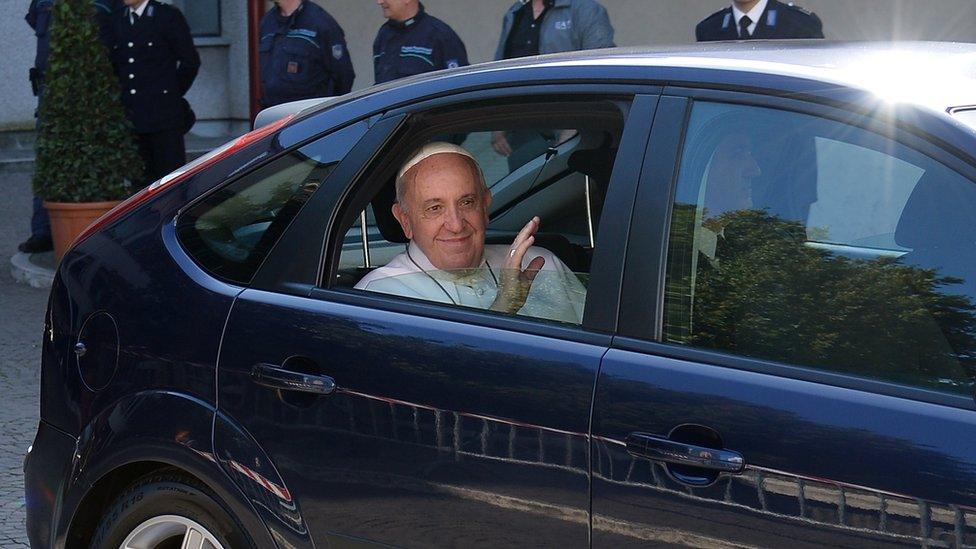Who is trolling the Pope?
- Published

Earlier this month posters criticising the Pope sprang up across Rome, and a spoof news story mocking the pontiff was sent to the city's cardinals. Christopher Lamb asks what it's all about.
I was shocked when I saw them.
I was sitting just a few rows behind a nun on a tram, when it stopped alongside some posters of a stern-looking Pope Francis. Underneath his glum, almost menacing face, was a list of complaints: he'd removed priests, ignored the concerns of cardinals and "decapitated" an ancient Catholic group, the Knights of Malta.
This is the opposite of what I have come to expect in Rome. The tram was winding through a part of the city where you're normally greeted by images of a smiling Pope, with arms outstretched or making a thumbs up.
Here in Italy the papacy is the closest thing there is to a monarchy, so perhaps it is no surprise that the city authorities ordered the offending text to be pasted over, leaving just the grim-faced image of Francis and a sign reading: "Illegal bill posting".
At roughly the same time the posters were plastered around the city's walls, cardinals in Rome were opening their email inboxes to find a "fake" front page of the Vatican newspaper, L'Osservatore Romano. It had the traditional Latin motto which sits on the paper's masthead beneath a papal coat of arms, and a list of questions sent to the Pope by a group of conservative cardinals, with the answer, in each case, "Sic et non!" - "Yes and no!"
This is the Pope being trolled on his home turf - and what's more, in Latin.

While Francis enjoys huge popularity among many ordinary Catholics he's facing resistance to his shake-up of the Vatican and he's infuriating believers from the Church's more traditional wing. The main source of tension has been - yes - sex. Francis wants to give communion to divorcees who have married again; his opponents say this undermines the Church's teaching on marriage, because second unions are adulterous. The questions shown on the spoof front page were all on this subject.
At the forefront of the opposition to Pope Francis is an American Cardinal, Raymond Burke, a stickler for the rules who once told John Kerry, when he was a presidential candidate, that he could not receive communion because of his previous support for abortion.
Cardinal Burke has dedicated much of his life to studying the church's laws, and he wants to ensure they are enforced. He believes this Pope is tinkering dangerously with Christianity's 2,000-year-old tradition and has even threatened to issue an "act of correction" against Francis. This would be a very bold, highly unusual move - it hasn't happened for centuries.
The cardinal lives in a large flat just off the grand thoroughfare built by Mussolini that leads into St Peter's Square from the River Tiber. It is here that he runs his operation for promoting what he calls "doctrinal clarity".

Custom and ceremony are held in high regard. When I visited to interview him I was shown past a cardinal's red hat sitting enclosed in a glass case, as if it was a holy relic, and then into a drawing room with high-backed chairs, where we waited in anticipation for the grand entrance. Sitting alongside me was his press adviser, who greeted the cardinal by kneeling and kissing the gold ring on the ring finger of his hand, the traditional sign of respect given to a prince of the church.
By contrast, when I have met Pope Francis - as a member of the Vatican press corps - we shake hands, and I can't help noticing that he looks slightly uncomfortable when people go down on one knee before him.

Find out more
From Our Own Correspondent has insight and analysis from BBC journalists, correspondents and writers from around the world
Listen on iPlayer, get the podcast or listen on the BBC World Service or on Radio 4 on Thursdays at 11:00 BST and Saturdays at 11:30 BST

The word in Rome is that the posters were the work of a right-wing group that dislikes the Pope's appeals for Europe to be more welcoming of immigrants. Once again, Cardinal Burke appears to be on the other side of the argument - he recently met the leader of the anti-immigration Northern League - but there is no evidence that he lies behind the posters, or the spoof news story. There are many conservative Catholics who are uncomfortable with some of Pope Francis's changes.
The Pope's decision to live in a Vatican guest house, carry his own brief case and be driven around in a Ford Focus has burst the balloon of papal pomp. Some regard this freewheeling approach as "un-papal", and resent his description of those on the traditional wing of the church as "rigid".

So far the Pope has shrugged off the criticisms.
"I'm not on tranquillisers," he joked recently. His way of dealing with the stress, he explained, is to jot down problems and place the notes under a figure of a sleeping St Joseph. St Joseph, the carpenter, is the figure Catholics turn to when facing practical difficulties. "Now he is sleeping on a mattress of letters!" Francis added.
The trouble is that the Pope's job is to be the rock of church unity. Alarm bells start ringing when a papacy becomes divisive. While Francis has been hugely successful in reaching out to lost sheep, he runs the risk of alienating those already in the fold.
The Pope has admitted that "cracks" are appearing between bishops and priests - rifts that if left untreated could develop into bigger problems. There may well be more papal trolling ahead.
Christopher Lamb is Vatican correspondent for The Tablet
Join the conversation - find us on Facebook, external, Instagram, external, Snapchat , externaland Twitter, external.